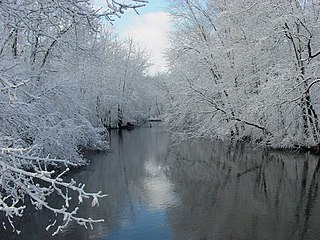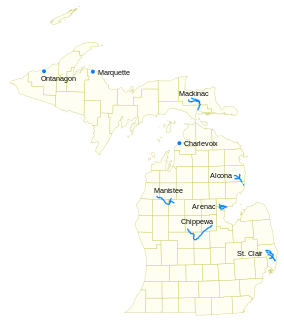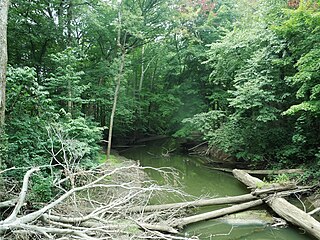| Eagle River | |
|---|---|
The Eagle River near its mouth in the community of Eagle River | |
| Country | United States |
| Physical characteristics | |
| Main source | at the confluence of its East and West Forks 47°23′21″N88°16′42″W / 47.38917°N 88.27833°W [1] |
| River mouth | in Eagle River, Michigan, at Lake Superior 47°24′54″N88°17′57″W / 47.41500°N 88.29917°W Coordinates: 47°24′54″N88°17′57″W / 47.41500°N 88.29917°W [1] |
The Eagle River is a 2.6-mile-long (4.2 km) [2] stream on the Keweenaw Peninsula of the U.S. state of Michigan. The river flows into Lake Superior in the community of Eagle River. Most of the river lies within Houghton Township.

A stream is a body of water with surface water flowing within the bed and banks of a channel. The stream encompasses surface and groundwater fluxes that respond to geological, geomorphological, hydrological and biotic controls.

The Keweenaw Peninsula is the northernmost part of Michigan's Upper Peninsula. It projects into Lake Superior and was the site of the first copper boom in the United States. As of the 2000 census, its population was roughly 43,200. Its major industries are now logging and tourism, as well as jobs related to Michigan Technological University and Finlandia University.

In the United States, a state is a constituent political entity, of which there are currently 50. Bound together in a political union, each state holds governmental jurisdiction over a separate and defined geographic territory and shares its sovereignty with the federal government. Due to this shared sovereignty, Americans are citizens both of the federal republic and of the state in which they reside. State citizenship and residency are flexible, and no government approval is required to move between states, except for persons restricted by certain types of court orders. Four states use the term commonwealth rather than state in their full official names.
The main branch of the river is formed at the confluence of its East Branch [3] and its West Branch [4] at the community of Phoenix, about two miles southeast of its mouth, and parallels M-26 from Phoenix into Eagle River. [5]

Phoenix is an unincorporated community in Keweenaw County, Michigan, United States. Phoenix lies at the junction of M-26 and US 41, about two miles south of Eagle River, Michigan, near the shores of Lake Superior.

M-26 is a 96.355-mile-long (155.068 km) state trunkline highway in the U.S. state of Michigan, running from two miles (3.2 km) east of Rockland to its junction with US Highway 41 (US 41) in Copper Harbor. It generally runs southwest-to-northeast in the western half or Michigan's Upper Peninsula. The northernmost segment, which closely parallels the shore of Lake Superior on the west side of the Keweenaw Peninsula, is highly scenic.
The east and west branches each run along the south side of the Cliff Range to meet in Phoenix and flow through a gap in the Cliff Range. The west branch rises about three miles southwest of Phoenix in northeastern Allouez Township. Cliff Drive runs alongside the river, and is joined by U.S. Highway 41 and M-26 about a mile and a quarter southeast of Phoenix. The only significant tributary on the west branch is Brodie Creek, which rises a bit further inland from the Cliff Range and enters the west branch just outside Phoenix.

Allouez Township is a civil township of Keweenaw County in the U.S. state of Michigan. As of the 2000 census, the township population was 1,584.
US Highway 41 (US 41) is a part of the United States Numbered Highway System that runs from Miami, Florida, to the Upper Peninsula of the US state of Michigan. In Michigan, it is a state trunkline highway that enters the state via the Interstate Bridge between Marinette, Wisconsin, and Menominee, Michigan. The 278.769 miles (448.635 km) of US 41 that lie within Michigan serve as a major conduit. Most of the highway is listed on the National Highway System. Various sections are rural two-lane highway, urbanized four-lane divided expressway and the Copper Country Trail National Scenic Byway. The northernmost community along the highway is Copper Harbor at the tip of the Keweenaw Peninsula. The trunkline ends at a cul-de-sac east of Fort Wilkins State Park after serving the Central Upper Peninsula and Copper Country regions of Michigan.
The east branch rises out of Beaver Pond about five miles east of Phoenix. It flows west along the south side of the Cliff Range, paralleled by US 41. The only significant tributary of the east branch is Buffalo Creek, which enters about three miles east of Phoenix.















